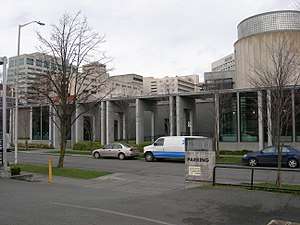Frye Art Museum
The Frye Art Museum is an art museum located in the First Hill neighborhood of Seattle, Washington, USA. The museum emphasizes painting and sculpture from the nineteenth century to the present. Its holdings originate in the private collection of Charles (1858–1940) and Emma (d. 1934) Frye. Charles, owner of a local meatpacking plant, set aside money in his will for a museum to house the Fryes' collection of over 230 paintings. The Frye Art Museum opened to the public in 1952, and was Seattle's first free art museum.[2][3] The museum building was originally designed by Paul Thiry, although it has since been considerably altered.[3]
 The Frye Art Museum (2007) | |

| |
| Established | 1952 |
|---|---|
| Location | 704 Terry Avenue Seattle, WA 98104 (United States) |
| Coordinates | 47.6071°N 122.3242°W |
| Type | Art [1] |
| Director | Joseph Rosa |
| Website | www |
Charles Frye's will required that the majority of the Fryes' own collection continue always to be on view in rooms of a certain size; stipulations were also made about lighting conditions and specifically concrete floors (ultimately elided by placing wood over the concrete). He also required that admission always be free. These conditions were enough to keep the Seattle Art Museum from being interested in his collection.[4]
The Fryes' collection consisted entirely of representational works, with a tendency toward "the dark, the dramatic, and the psychological" rather than "the genteel". The museum's permanent collection reflects Charles Frye's relatively conservative artistic tastes, and (despite the lack of any such stipulation in the will) the museum continued to be dedicated exclusively to representational art, both in its acquisitions and its exhibits.[4] This conservatism reflected the artistic and social values of its first director, Walser Greathouse (d. 1966) and of his even more conservative widow and successor Ida Kay Greathouse, who ran the museum until 1993.[2][3]
However, exhibits under new, professional management in recent years have been far more venturesome, eliciting comparisons to Seattle's Henry Art Gallery.[4] Exhibits in recent years have included "Wondertoonel," an exhibit of Mark Ryden's often morbid images of childhood,[5] "The Retrofuturistic Universe of NSK" (2005),[6] and "Henry Darger: Highlights from the American Folk Art Museum" (2006),[7] The museum has also repeatedly redeployed its permanent collection, experimenting with exhibiting it in different arrangements. In 2007, for the first time, other pieces are sharing the rooms dedicated to the original Frye collection; they are being juxtaposed against pieces from the Henry Art Gallery's founding collection.[4]
Collection
The Frye Art Museum's collection highlights many kinds of paintings, prints, works on paper, and sculptures.[1] Artists represented at the museum include Eugène Boudin, William-Adolphe Bouguereau, Félix Ziem, Eugène Isabey, Franz von Lenbach, Tim Lowly, Fritz von Uhde (Picture Book), Hermann Corrodi (Venice), Ludwig von Zumbusch, Leopold Schmutzler and Franz Stuck (Judgment of Paris).
Library
The Frye Art Museum library contains 1000 books as of 2011. It specializes in 19th and 20th century American and German art.[8]
Notes
- Frye Art Museum: About, ARTINFO, 2008, retrieved 2008-07-28
- History, Frye Art Museum. Accessed 6 December 2007.
- Priscilla Long, Frye Art Museum on Seattle's First Hill opens on February 8, 1952, HistoryLink, March 22, 2001. Accessed 6 December 2007.
- Jen Graves, The Pepsi Challenge: The Henry's and the Frye's Original Collections Together for the First Time: Can You Guess Who Collected What?, The Stranger, November 22, 2007, p. 29.
- Andrew Engelson, Mark Ryden, Seattle Weekly, December 8, 2004. Accessed 6 December 2007.
- The Retrofuturistic Universe of NSK, Frye Art Museum. Accessed 6 December 2007.
- Henry Darger: Highlights from the American Folk Museum, Frye Art Museum. Accessed 6 December 2007.
- American Library Directory. 2 (64th ed.). Information Today, Inc. 2011–2012. pp. 2568–2576. ISBN 978-1-57387-411-3.
External links
- Official website
